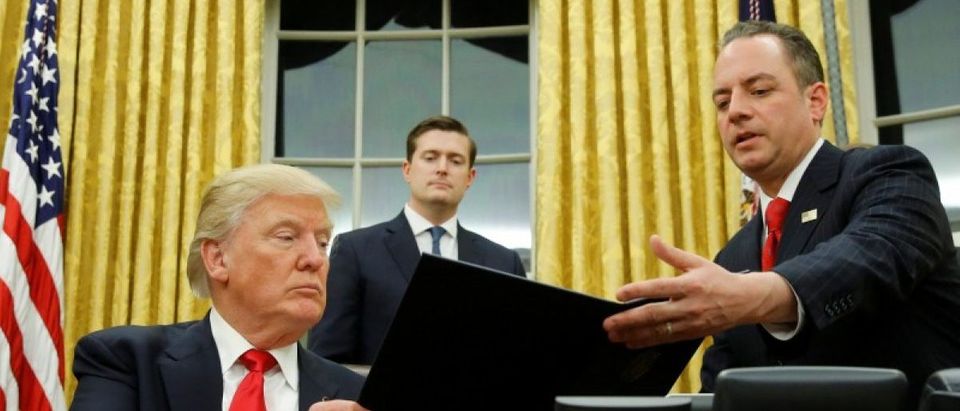As House Republicans are gearing up to bring Obamacare repeal bills before the main Congressional health care committees this week, there are four things consumers should focus their attention on.
1) How Similar Is The Bill To Health Secretary Tom Price’s Proposal?
Speaker of the House Paul Ryan said Friday that the Republican plan to “repeal and replace” Obamacare is “very similar to the bill that Tom Price had worked on for so many years.” While a member of Congress, Price put forth an alternative to Obamacare called the Empowering Patients First Act of 2015.
The 2015 bill features many of the components of the highly anticipated GOP platform, including: expanding consumer health savings accounts, increasing the number of tax-deductible contributions, and greater state control over government health care programs like Medicare and Medicaid.
Kevin Brady, chairman of the House Committee on Ways and Means, said Saturday that the GOP repeal platform will roll back every single tax implemented by Obamacare, including both the individual mandate and the subsidies provided to states to help low-income consumers obtain health coverage.
Brady corroborated Ryan’s claims that the bill will look similar to Price’s original proposal. The repeal effort will begin by giving states more control of Medicaid, and will also include Price’s plans to expand health savings and tax-deductions to help consumers purchase insurance.
2) Does The GOP Platform Include A Tax Credit Or Tax Deduction?
One of the key things to look for is how Republicans shape tax credits to help low-income individuals obtain health insurance. The question for consumers and regulators will be: are the tax credits modeled after the GOP platform presented to lawmakers in February, or does the plan include tax deductions similar to Price’s proposal?
Thus far, tax credits have been a point of contentious debate among GOP lawmakers. The structure and availability of these credits could ultimately decide how many people get coverage.
Current proposals floating around Capitol Hill contain “what increasingly appears to be a new health insurance entitlement with a Republican stamp on it,” Chairman of the Republican Study Committee Mark Walker said in late February. The congressman said that, without “substantial changes, I cannot vote for the bill and, in good conscience, cannot recommend RSC members vote for it either.”
A chief criticism touted by Democrats and Obamacare supporters is that tens of millions of Americans will lose coverage if the 2015 GOP repeal platform is enacted, because it would roll back credits and subsidies given to low-income consumers to buy health insurance.
The original proposal presented to lawmakers included tax credits awarded based on the age of the consumer. Under the early version, tax credits would be set at $2,000 for consumers under 30 and $4,000 for consumers 60 and older. Walker issued a warning against using tax credits, arguing that credits are too costly to implement and that the members of his committee prefer tax deductions over credits.
As it currently stands, GOP lawmakers have reportedly altered the plan to include an income cap on tax credits. By capping credits based on income, Republicans could avoid spending money on wealthy consumers that should otherwise be allocated to those who need it most. If an income cap is included in the platform, that could work to both lower costs and increase the number of consumers with health insurance.
Despite recent attempts to alter tax credits by lawmakers, there may still be some cause for concern among consumers. One of the GOP proposals circulating the House would give consumers an average tax credit 36 percent lower than what they would get if Obamacare continued as it currently stands, the Kaiser Family Foundation reports. The report also finds that Price’s plan would grant consumers a credit that is 51 percent less than what it would be under Obamacare.
Brady says the details of the bill will be finished soon and then the legislation will be sent to the House for review.
3) What Are The Revised Estimates By The Congressional Budget Office?
Republicans are working tirelessly on cutting costs, after initial budget impact estimates for the GOP repeal agenda by the Congressional Budget Office (CBO) were negative. Next to the issue of tax credits, the budget projections for the Republican platform have been a key focus in recent weeks.
The CBO projects that premiums for individual policies purchased either through marketplaces or through insurers will increase between 20 and 25 percent in the first year after the law is repealed. The increase would double to 50 percent the year after eliminating the Obama administration’s Medicaid expansion program and marketplace subsidies — two key pillars of the Republican agenda.
4) Will Everyone On Medicaid Be Able To Keep It?
GOP Rep. Greg Walden of Oregon told reporters Saturday that those currently receiving Medicaid benefits will be able to continue to get the same coverage under the Republican repeal plan. “If you’re on Medicaid today, you’ll be on Medicaid tomorrow,” Walden told reporters. “We’re not going to pull the rug out.”
The congressman included a caveat: while those who currently get Medicaid benefits can continue under the GOP platform, future recipients might not get as much aid, because funding those liabilities is “not sustainable,” Walden said.
Medicaid provided health coverage for 97 million Americans in 2015. Some 31 states and the District of Columbia opted to expand their Medicaid program under Obamacare, adding around 17 million more people to the program since 2013.
The program also covers over 60 percent of all nursing home residents and 40 percent of the costs of long-term care.
Send tips to robert@dailycallernewsfoundation.org
All content created by the Daily Caller News Foundation, an independent and nonpartisan newswire service, is available without charge to any legitimate news publisher that can provide a large audience. All republished articles must include our logo, our reporter’s byline and their DCNF affiliation. For any questions about our guidelines or partnering with us, please contact licensing@dailycallernewsfoundation.org.












